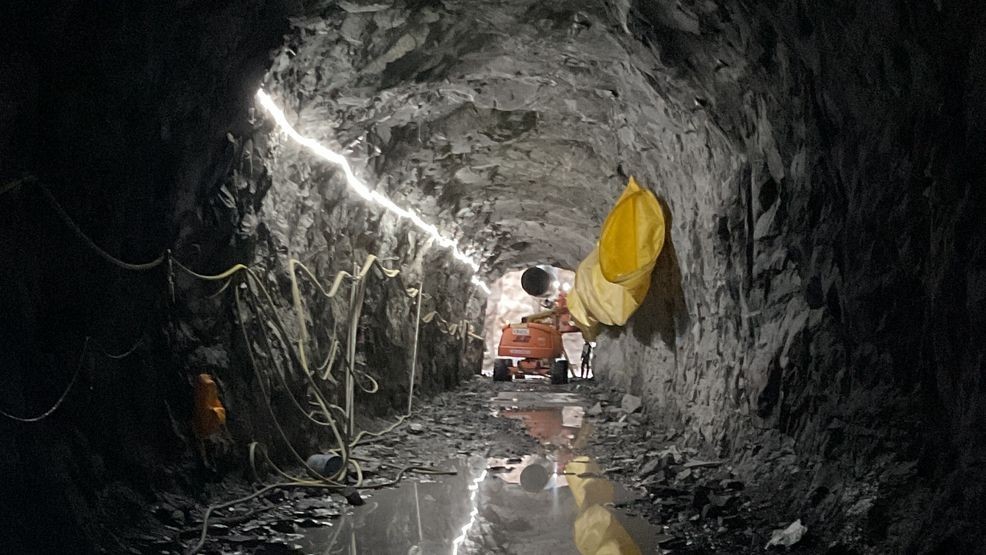LYNCHBURG, Va. (WSET) — The city of Lynchburg is working on its largest capital improvement project in history, and it’s all happening right below your feet.
“We are building the Blackwater CSO Tunnel. It’s a tunnel that’s nearly a mile long, when it’s finished it’ll be about 12 feet in diameter, and it’s up to 120 feet below the surface of the ground,” Tim Mitchell, Director of Lynchburg Water Resources, said. “It runs from downtown, up along the Point of Honor trail.”
The Blackwater CSO Tunnel is the capstone to a 45-year project, working to protect Lynchburg’s treasured waterways.
The main purpose of the tunnel is to collect combined sewage and stormwater during heavy rainfalls, so that we can ultimately treat that at the wastewater treatment plant,” Mitchell said. “Right now, when we have a heavy rainfall, we have sewer overflows that go into the Blackwater Creek and the James River, and our goal that we’ve been working on for a long time now, is to reduce that overflow and eliminate a lot of the CSO overflow points.”
When complete, the tunnel will be able to hold up to 4.7 million gallons of sewage and storm water overflow, helping keep it off the trail and out of our water.
“When we have a heavy rainfall, flow will go into the tunnel, and then we’ll pump it out and it’ll flow to the wastewater treatment plant to be treated after the rainfall event ends,” Mitchell said.
RELATED: Delve into a progress update on Lynchburg’s massive Blackwater CSO Tunnel project
Construction is currently underway, with a tunnel access point on Seventh Street in downtown Lynchburg. However, you may not have noticed much progress yet, because it’s been blasting forward right under your feet.
We sank a shaft, it’s 44 ft. diameter. We dropped it 98 feet underground before we turned under and started driving the tunnel,” Kevin Kilby, senior construction manager on the project, said. “We have a drill that we call ‘jumbo,’ it’s got two drills on it and they’re on arms. They drill a pattern out all the way around, and then about a two by three pattern inside, those are ten feet deep. That is then loaded with explosives and shot in a timed manner, so not all the holes are going off at once.”
So far, they’ve excavated a little over 1,000 feet.
“It’s a project that once it’s complete, nobody will ever see or really even know about, but it’s very critical for the citizens of Lynchburg and for the environment,” Mitchell said. “Our goal is to eliminate as many overflows as we can and restore the water quality in the Blackwater Creek and the James River. From an aquatic life standpoint and a recreation standpoint, it’s very essential that we clean up the rivers and clean up the stream, so that quality of life and quality of the area is improved, and I think this tunnel once it’s done, the cumulative effect of the CSO project will eliminate 98% of the overflows.”
You can watch their progress through their online tunnel tracker.
This is a really significant project. It’s really important for the future of Lynchburg, protecting our waterways and expanding capacity for future growth. So, it’s important that because this is the largest capital improvement project in Lynchburg’s history, that folks know what we’re doing and why it’s important,” Jason Snyder, communications manager for Lynchburg Water Resources, said.
RELATED: Lynchburg to start Blackwater CSO Tunnel, the city’s largest capital improvement project
Mitchell said the project costs between 104 and 105 million dollars overall, but folks in Lynchburg are largely off the hook.
“Having that as a huge burden on our sewer rate payers would not have been feasible, so we pursued state and federal funding to help out with the project and we were able to secure, through our state delegation and the governor’s office, up to $50 million in ARPA funding to help offset the cost of the project. We are also receiving an additional almost $25 million in principal forgiveness for a loan that we’re receiving from the state. So, that will help reduce the overall burden on the citizens of Lynchburg by a tremendous amount. We’re basically getting a 105 million dollar project for about 29 million dollars,” Mitchell said.
To date, the city has been able to eliminate 93% of overflow pollutants from entering our waterways. The tunnel is set to be completed in the summer of 2027 and will bring that number to 98%.
